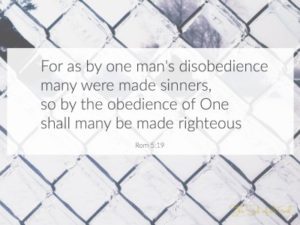In the modern gospel of grace, everything is allowed. All behavior, including sin, is allowed and accepted, due to the so-called love of God and the grace of God. This means that you can stay the way you are, do what you want to do, and live the way you want to live. But is this true? What is grace according to the Bible? What does the grace of God mean for the lives of born again Christians? If you don’t have to change due to the grace of God, then why did the prophets, apostles, and Jesus call the people to repentance and talk about removing sins and living a holy life?
What kind of grace did Jesus and the apostles preach?
The apostles lived in the same spiritual dispensation of grace as we live in. In their letters, which were written after the death and resurrection of Jesus Christ and after the coming of the Holy Spirit, they not only wrote gentle and encouraging words to the believers. But they primarily wrote corrections, chastening, the removal of sins, putting off the old man, sanctification and the call to live a holy life. (Lestu líka: How to put off the old man? og How to put on the new man?
In the Book of Revelation, which was also written after the death and resurrection of Jesus Christ and after the coming of the Holy Spirit, Jesus not only spoke gentle positive words to His Church. But Jesus confronted the believers of the seven churches with their behavior and works and called them to repentance. (Lestu líka: The call to repentance).
Were Jesus and the apostles liars?
If the grace of God would be the same as the grace of God that is preached today, whereby you won’t have to change and may live the way you want to live, then that means that Jesus and the apostles spoke lies to the believers, who belonged to the Church; the Body of Christ.
Because if believers won’t have to change after they are born again, then why did Jesus and the apostles confront them with their works? Why did Jesus and the apostles command them to change their behavior and their walk? Who is telling the truth? Jesus and the apostles or the modern preachers and teachers of today?
If God’s grace would approve and tolerate every kind of behavior, even if it contradicts the Word, and wouldn’t hold believers accountable for their words and works, then Jesus and the apostles wouldn’t have to correct the believers. They only had to say “Well done, keep on going!”
But Jesus and the apostles didn’t say that. They warned the believers and confronted them with their words, works, and life. They often spoke hard words to the churches, just like Jesus spoke hard words during His walk on this earth, after His resurrection, and during His appearance to John in the Book of Revelation.
Based on the words of Jesus during His walk on earth and after His death and resurrection and His Kingship, we can conclude that if someone belongs to Jesus and wants to follow Him, then the person can’t remain living after the flesh and keep living in sin and not change, and do what the person wants to do.
Because the day will come when everyone, including believers, will stand before His throne and be judged according to … their works (2 Korintubréf 11:15, Opinberun 20:12-15).
That means, that works are important. That means, that the way a person lives and what a person does, do matter according to the Word of God.
But what does the grace of God, which everyone talks about, meina? To prevent this blog post from becoming extremely long, this subject will be discussed in several blog posts.
What is grace?
In the New Testament grace has been translated from the Greek word ‘χάρις’, no 5485 (SC) which means: grace, the state of kindness and favor towards someone, often with a focus on a benefit given to the object; by extension: gift, benefit;credit; words of kindness and benefit: thanks, blessing:- grace favor, thanks, thank, pleasure, acceptable, benefit, gift, gracious, liberality, thanked, thank worthy.
Grace means, that you receive something without having to work for it. If you didn’t have to do anything for it, you can’t earn it. That’s why grace is unmerited favor. Because as soon as you earned it by your works, it is no longer grace, but your own merit (Romans 11:5-6).
This also applies to the grace of God. The grace of God shows us God’s goodness, mercy, and love towards people, and relates to the perfect work of redemption of Jesus Christ and the redemption and restoration of fallen man, who is reconciled with God and gained access to the Kingdom of God through regeneration.
Only by faith, you can become a partaker of the grace of God. By faith in Jesus Christ and His work of redemption and through iðrun og regeneration, you are justified and accepted by God.
You are not justified and made holy and righteous by your own works but by the work of Jesus Christ. Through regeneration in Christ, you have become a partaker of the Divine nature of God (Romans 4:16-17, Titus 3:5-7, 2 Pétur 1:4).
Every person on this earth has been given a free will to make a choice to become a partaker of the grace of God or not.
Náð Guðs; the promise of the Messiah
In the Garden of Eden, after man had sinned and fallen from his position, God made a promise of the (spiritual) restoration of fallen man, to man and his seed (offspring). God promised that He would put enmity between the serpent and the woman and between his seed and her Seed and that it would bruise his head (Mósebók 3:15). The Seed referred to Jesus Christ.
By His promise, God showed His grace; His mercy, and goodness, because man didn’t deserve it.
It is important to know, that Adam didn’t belong to the carnal people of Israel. Adam was the son of God, the first-born human being on this earth, and the father of fallen man; sinners.
Because of his disobedience to the words of God, Adam fell from the position that God had given to man. His spirit, which connected him with the Father, died and Adam was spiritually separated from God.
Man became a living soul and consisted of a body and soul (flesh).
Those, who would be born of the seed of man, would be born in a fallen state as a fallen man; syndari. No one was excluded! That’s why God said, that the Seed of the woman would bruise the head of the devil. Since no one, who would be born of the seed of man and would be born as a sinner, would be able to bruise the head of the devil and take away his authority. Because everyone, who is born as a sinner lives under the authority of the devil (fallen archangel) and is placed beneath the angels.
In the Garden of Eden, God promised the restoration of fallen man and the reconciliation between God and man. Man didn’t deserve it, and would never be able to deserve it, but God made this promise and He kept His promise.
Because of God’s great love, goodness, and mercy, God gave His only begotten Son Jesus Christ to redeem fallen man and restore the position of fallen man (John 3:16).
You can’t deserve grace by works
For all have sinned, and come short of the glory of God; Being justified freely by His grace through the redemption that is in Christ Jesus: Whom God hath set forth to be a propitiation through faith in His blood, to declare His righteousness for the remission of sins that are past, through the forbearance of God; To declare, I say, at this time His righteousness: that He might be just, and the justifier of him which believeth in Jesus (Romans 3:22-26)
Sérhver, who is born of the seed of man is born as a sinner. There is no one excluded. Every person, who is born on this earth in the flesh, needs redemption of his fallen nature, which is present in the flesh, including those, who belong to the carnal people of God. Because God’s promise was for His carnal people first and then for the Gentiles (Isaiah 56, Hosea 2:23, Romans 9:24-29)
The soul of the fallen man lives in a body. But the spirit of the fallen man (sinner) is dead and stays dead.
The fallen man (sinner) lives under the authority and rulership of the devil and his kingdom and is not able to escape his kingdom and his reign by his own works. Fallen man is not able to escape death through his own works.
There is only one way: through faith in Jesus Christ, His work, and regeneration.
Jesus Christ dealt with the sin problem and the sin nature that is present in the flesh of fallen man. Jesus conquered sin and iniquity at the whipping post and on the cross.
Jesus became the Substitute for fallen man and took all the sins and iniquities of humanity, which lead to death, upon Himself and took the death penalty. Svo að, Jesus would enter Hades and conquer death and reinstate the position of fallen man and reconcile man back to God.
Sérhver, who believe in Jesus Christ, the Son of the living God, repents and becomes born again, would be redeemed from death by laying down his flesh. The person would be made holy and righteous by the blood of Jesus and his spirit would be raised from the dead by the power of the Holy Spirit and receive eternal life (Romans 3:24, Efesusbréfið 1:4-12, Titus 3:5-7, 1 Pétur 3:18).
That’s why Jesus had to become equal to man (identify Himself with man), so that He could become our Substitute. Only when you identify yourself with the death and resurrection of Jesus Christ, you will have peace with God and receive eternal life (Lestu líka: ‘Var Jesús að fullu mannlegur?‘).
Being justified by faith in Jesus Christ
Therefore being justified by faith, we have peace with God through our Lord Jesus Christ: By Whom also we have access by faith into this grace wherein we stand, and rejoice in hope of the glory of God (Romans 5:1-2)
By faith in Jesus Christ; the Son of the living God and in His perfect work of redemption, that Jesus has accomplished at the cross, are those, who believe in Him, repent and become born again, made righteous and redeemed from death ((1 Korintubréf 1:4, Romans 5:15, Titus 3:5-7).
Through regeneration, you have crucified your flesh with its sinful nature, and in which sin dwells and causes you to persevere in sin, and by the power of the Holy Spirit, your spirit is raised from the dead. You have been redeemed from the power of the kingdom of darkness and transferred into the Kingdom of His dear Son Jesus Christ (Kólossubúar 1:13-14).
The promise of God is also for the Gentiles
It is the grace of God, that the promise of God is not only for God’s carnal people (Ísrael), and that God not only gave them the ability to be saved from death and be redeemed from the sinful nature of fallen man, but God also gave the ability to the Gentiles to be saved and be redeemed from the power of the devil, that reigns in the sinful nature of the flesh, and that through regeneration they’ll be reconciled to God and have received the power to become sons of God.
Everyone has been given the ability to become part of God’s people, through the circumcision in Christ (John 1:12-13, Virkar 4:33-34, Romans 15:15-16, Efesusbréfið 3:6, Kólossubúar 1:6, 2 Tim 1:9-10, Titus 3:4:7,1 Pétur 1:10-11).
By faith in Jesus Christ and through regeneration in Christ, you have become a ný sköpun; a new man. You have become a partaker of His divine nature by the indwelling of the Holy Spirit.
It is grace, that by faith in Jesus Christ you have been made righteous and have peace with God (Romans 5:1-2).
It is grace, that by His work of redemption, you have received His (spiritual) inheritance; Hans heilagi andi. It’s not by your works, what you have done, and not because you deserve it (Virkar 20:32, 1 Korintubréf 1:4-5, Galatians 1:3-5).
Because due to the fact, that the flesh contains the sinful nature, every work that derives from the flesh is evil and corrupted with sin and that’s why man will never be able to deserve nor to accomplish the state of righteousness by his own carnal works.
Through the grace of Jesus Christ, He Who was rich became poor, so that through His poverty, you could become (andlega) rich (2 Korintubréf 8:9).
Saved by grace
En Guð, sem er ríkur af miskunn, vegna mikillar elsku hans, sem hann elskaði okkur með, Jafnvel þegar við vorum dauðir í syndum, hefur lífgað okkur með Kristi, (by grace you are saved;) og hefur reist oss upp saman, og lét oss sitja saman á himnum í Kristi Jesú: That in the ages to come he might shew the exceeding riches of His grace in His kindness toward us through Christ Jesus. For by grace are you saved through faith; and that not of yourselves: it is the gift of God. Not of works, lest any man should boast (Efesusbréfið 2:4-9).
It is the grace of God, that He made you alive in Jesus Christ and saved you.
It is the grace of God, that He has given you in Christ a place in the heavenly places and that you are seated in Him.
Now you may live in the grace of God and show God’s mercy, goodness, and grace to the people around you, by preaching the gospel of grace, which is the message of Jesus Christ, the cross, and God’s perfect work of redemption, and give them the ability to come to Jesus Christ, and accept Jesus as Saviour and make Jesus Lord over their lives, so that they will be redeemed from their sin nature and saved from death. Through faith in Jesus Christ, iðrun, and regeneration they become partakers of the grace of God.
Because that’s the gospel of grace: that every sinner, no matter what the person has done, may come to Jesus (Virkar 20:24, 1 Pétur 4:10).
Eini hluturinn, that the person has to do is to iðrast and become born again in Christ, which means that the person will crucify and lay down his flesh so that the spirit in man can be resurrected from the dead by the power of the Holy Spirit. Because the spirit of man cannot be resurrected from the dead unless the flesh has died.
No one can earn his or her salvation. No one can be saved and be made righteous and holy by doing ‘good works’, charity work, going to church, and/or keeping the law.
Only through the grace of God and by faith in Jesus Christ, through repentance and regeneration, every sinner can be redeemed from his sinful nature and saved from death. That’s why, it’s so important to keep preaching this message of the grace of God, which is the message of the cross.
What do you do with the grace of God?
Wherefore we receiving a kingdom which cannot be moved, let us have grace, whereby we may serve God acceptably with reverence and godly fear: For our God is a consuming fire (Hebrew 12: 28-29)
But…. Now that you have found grace in God’s eyes, which means that you are saved by faith in Jesus Christ and are accepted by God and through regeneration, you have become His son, what do you do with His grace? (Efesusbréfið 1:5-7, Titus 2:11-14)
What do you do with your new position as a son of God and what do you do with the inheritance, which you have received in Jesus Christ?
Hvað gerir þú, to show God your gratitude? Do you thank Him, honor Him, glorify Him and exalt Him with your life, by walking in His grace and after His will? (2 Þessaloníkumenn 1:12)
Or do you stay carnal and keep living for yourself and do you use the grace of God and all that you have been given for yourself, to satisfy the lusts and desires of your flesh and to build your own kingdom?
Although you are not justified and made holy and righteous by your own works but by His grace and work, the works of righteousness will follow you. Because you have been made righteous in Christ and have become a new creation in Him and have God’s nature, you will walk after the Spirit in righteousness and do righteous works.
Because of the fact, that by faith in Jesus Christ; orðið, and by His work you have been made righteous, you shall also do what the Word tells you to do because what you do will confirm your faith. When you say that you believe, but you don’t do what the Word tells you to do and therefore become óhlýðinn to the Word, then your faith is without works and therefore your faith is meaningless and death (Romans 4:4-5, James 2:14-26)
Já, you have been saved by the grace of God and entered the Kindom of God, but by everything you say and do in life; your works, you decide whether to stay saved and stay in the Kingdom of God or not (Lestu líka: ‘Once saved always saved?‘).
You can’t be saved by your works and by keeping every commandment of the law, but your works do testify, to whom you belong: Jesús, the Word and the Kingdom of God or the devil, the world and the kingdom of darkness.
„Vertu salt jarðar“








